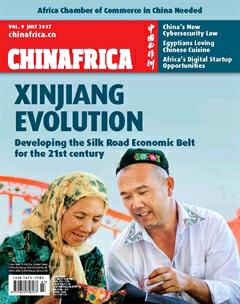A New Digital Chapter
By+Ji+Jing

Chinese contemporary literary works are gaining popularity abroad thanks to the emergence of online translation forums like Wuxiaworld.com, which is dedicated to Chinese-to-English translation of martial arts and fantasy novels.
Lai Jingping, a former U.S. diplomat, set up the Wuxia World website in 2014, which now features complete translations of seven works including Horizon, Bright Moon, Sabre by kungfu novelist Gu Long (1938-85) as well as Seven Killers and Stellar Transformations by Zhu Hongzhi, who shot to fame by publishing online novels with the penname “I Eat Tomatoes.”
Wuxia, meaning “martial heroes,” refers to a style of fictional stories about ordinary humans who achieve supernatural fighting abilities through Chinese martial arts training and internal energy cultivation. Themes of chivalry, tragedy, revenge and romance are common.
Online publishing
The website currently has more than 30 projects underway in which translations are regularly uploaded chapter by chapter and offered to readers for free. For revenue, it relies on advertisements and donations from readers.
Translations of fantasy novels form the bulk of the ongoing projects. Some are inspired by Taoism and feature magic, demons, ghosts and immortals. Protagonists usually attempt to cultivate immortality, seeking eternal life and the pinnacle of strength. Some even blend Chinese folklore and mythology with foreign elements and settings.
Compared with traditional martial arts novels, which are heavily laden with Chinese history and culture, fantasy novels more easily strike a chord with foreign readers because they are often set in a fictional background and borrow many elements from foreign counterpart genres and online games.
According to Wuxiaworld.com, the website possesses over 2.5 million active users and received around 4 million clicks and nearly 300,000 visitors daily during the first two months of this year.
Skilled translators underpin the websites success. According to Lai, the ideal translator is an overseas Chinese fan of martial arts novels who knows how to employ language comprehensible to foreign readers when dealing with unfamiliar Chinese concepts, instead of simply transliterating terms using pinyin, phonetic translation of Chinese.
“The popularity of Chinese online literature abroad is unprecedented and even unbelievable. This will greatly boost the confidence of the sector,” Shao Yanjun, an associate professor at Peking Universitys School of Chinese Language and Literature, told Peoples Daily.
An analysis of Lais website shows its readers are based in over 120 countries - 35-40 percent in North America, 25 percent in Southeast Asia and 20 percent in Western Europe. Over 85 percent of the readers are males aged between 18 and 30.
“Such a proportion is similar to the makeup of domestic readers. Domestic and foreign readers both aim to seek a sense of pleasure from reading works of such genres,” Lai told Global Times.
Wuxia mania
Born in Chengdu, capital of southwest Chinas Sichuan Province, Lai emigrated to the United States with his parents at the age of three.
He still vividly remembers his excitement at watching a Hong Kong kungfu film for the first time in 1995. Being unable to understand Cantonese or the Mandarin subtitles, he searched the web for translated versions of martial arts novels. However, the existing translations at that time hardly made sense for readers of a different cultural background. Driven by his love for martial arts novels, Lai started to learn Chinese with the help of his parents. He also took Chinese as an optional course while studying international relations at the University of California, Berkeley.
Lai started translating Chinese martial arts novels- such as Demi-Gods and Semi-Devils by Louis Cha, better known by his penname Jin Yong - while at university and posted them on a review website for dramas produced in East Asia. The initial translations generated little interest among foreign readers. Later, though, Lai hit upon Coiling Dragon by “I Eat Tomatoes,” which he also translated into English. The novel was so popular that he created the Wuxia World website in December 2014.
Finding it difficult to juggle his hobby with the demands of his career, he quit his job as a diplomat at the end of 2015.
His parents were disappointed with him for giving up such a decent job, but Lai is confident about the future. “Without seeing the potential of wuxia novels, I would not have abandoned my diplomatic career,” he told Asia Times.
Lai moved back to his hometown, Chengdu, and began to translate novels and operate his website fulltime.
Cultural envoy
Lai dreamed of improving Sino-U.S. relations by becoming a diplomat. However, now he has chosen another path - promoting Chinese culture abroad - to achieve the same goal.
In Lais opinion, Chinas international communication previously overemphasized serious culture, which partly explains why it was not very effective. Popular culture is the key to spreading Chinese culture abroad, according to Lai.
“Has European and U.S. culture been spread to China through Shakespeares works? No. Its via Hollywood movies and sitcoms such as Game of Thrones, Prison Break and Friends,” he said.
But the entrepreneur does more than just translate novels. Lais website has a special section explaining Chinese concepts such as Tao, also romanized as Dao, yin and yang and the Five Elements. And hes opening up new markets overseas, where online literature is at a nascent stage of development.
In China, the number of online literature readers had grown to 333 million by December 2016, accounting for 45.6 percent of Chinas Internet users, according to the China Internet Network Information Center.
Lai noted that in countries with mature publishing systems, popular novels are often brought to the market by publishing houses, and writers who publish online are of mediocre level. In China, online novels thrive because traditional publishing houses have failed to grasp the opportunities brought by popular novels, he said. This situation can be seen as analogous to developing countries leapfrogging in technology by skipping landlines and moving directly to the era of mobile phones.
Lai believes his website will develop among foreign readers the habit of following the publication of novels chapter by chapter.
However, compared with the vast amount of online literature created in China every year, the amount that has spread abroad is very limited.
Shao said online literature, which has reached a global audience, has very few Chinese elements because works with a strong Chinese character are not only difficult to translate, but also hardly arouse interest among foreign readers.
Shao suggests developing TV dramas, animations and games related to online novels in order to accelerate their globalization.
“Chinese web novels have the potential to join the ranks of Hollywood movies, Japanese anime and South Korean TV dramas as a globally popular element of culture which represents Chinas soft power,” said Shao.

